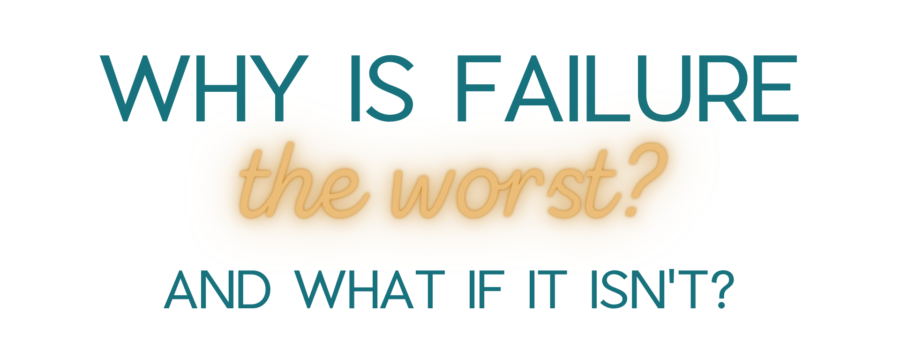Failure is one of those icky, gross words we don’t like to use. It makes us cringe to think about and even worse to admit we’re thinking about. We live to avoid it and feel awful when we can’t. Failure brings shame, embarrassment, and a fragile sense of self-worth. It changes how we see ourselves and maybe how others see us, too.
We don’t want to fail.
And when we do, we fall apart.
At some point in our lives we were taught failure isn’t an option for some reason. And so, it isn’t an option.
We will work hard. We will perform. We will please. Because we are scared of what will happen if we don’t.
I was curious to see how Mirriam-Webster defined failure because I see it as a subjective term. It could mean something different for me than it does for you. Here are three definitions that seem to fit with this thing we are all trying to avoid:
- A lack of success
- A falling short
- One that has failed
We will look at this more in a minute, but this goes so far as to even label a person a “failure” if they fail. This is one of our worst fears — to be a failure.
On our Full Life Christian Counseling Facebook page, we recently asked this question: Why do we feel so uncomfortable with past or potential future failure?
Here’s some of the answers:
- A parent’s expectations were too high throughout childhood
- Because our education system is built on a pass-fail system. It’s been ingrained in us for years.
- Fear of disappointing those we care about
- Shame, fear of a loss of connection or value to others or rejection
- We associate it with our value and worth. If we fail, then we must be a failure.
- Disappointment in self and regret from past failures
We don’t want to let ourselves down. We don’t want to let others down. And if we’re really being honest, we don’t want to let God down.
So we strive for perfection, even though somewhere inside we know it isn’t possible.
Today, I want us to look a bit closer at each of those three definitions of failure, and then we will continue this series digging into those reasons failure feels so uncomfortable. In order for us to begin to move past our fear of failure, we need to look at it with more gracious eyes.
A Lack of Success
What does this even mean? Success. What is that? The American dream? A college degree? All A’s? A high-paying job? A promotion? Well-behaved kids? A healthy relationship? Being called a good friend? This seems so vague.
And what’s so enticing about success? Maybe it’s the fame. The fortune. The security.
Many Christians will lean into this and say that God wants them to be successful, too. But what if success wasn’t what God wanted for us at all? Because the more we feel “successful,” the less we think we need him. It’s the Tower of Babel. Look at what they said:
“Come, let us build ourselves a city, with a tower that reaches to the heavens, so that we may make a name for ourselves; otherwise we will be scattered over the face of the whole earth.” (Genesis 11:4, emphasis mine)
Yikes. That sounds a lot like idolizing success. And God didn’t like that very much.
Now, success isn’t the enemy. There are plenty of successful people who have a humble, sincere walk with God. However, it becomes an idol, and therefore, an enemy, when we live our lives for it. And that is pride.
So a lack of success is failure? Well maybe a lack of success could be a result of a failed endeavor, but if we look at this more graciously, we can change the language here. A lack of success is just that— a lack of success. We didn’t reach a goal we wanted to reach. We didn’t treat someone well. We didn’t do our best. We do what we can with what we have.
We don’t have to live for success in our jobs and finances and status and relationships. We can strive for excellence, but it’s okay if not every endeavor meets your requirements for success.
A Falling Short
If you are familiar with scripture, this one sounds familiar doesn’t it?
“For all have sinned and fall short of the glory of God.” (Romans 3:23, NIV, emphasis mine)
Do you hear that? No one is perfect. Not one person. Every single one of us has and will continue to fall short. We can’t be God. And honestly, that’s so freeing. Perfection is a standard that’s too exhausting to try to reach. Falling short is something we can attempt to avoid, but in the end, none of us can.
So if this is true, then we’ve all failed. And, we all will fail again.
Which is why the gospel is so beautiful— we aren’t perfect, but He is. We aren’t good enough, but He is. We fail, but God never fails. This is why we need Him. He welcomes us in, failures and all, and covers those imperfections with himself. He is enough for us. We don’t need to be enough.
One That Has Failed
I want you to hear me clearly: just because you fail at something doesn’t mean you are a failure. It just means you’re human. And it’s okay to be human. We don’t have another option, do we?
Our failure doesn’t have to define who we are, but if we are going to let this definition stay put, then we are all failures, I guess. Because no one is perfect, remember?
And even if we are “failures,” Jesus loves us and redeems it all. When God sees us, he doesn’t see failure. He sees the forgiven ones. The redeemed ones. The ones who’ve been made new. He sees new mercies every morning. He sees hope and potential. He sees the blood of His son that has covered us and made us white as snow.
Because of Jesus, our failings don’t make us failures anymore.
Thanks be to God.
We will continue this series next week, but for now, our prayer is that failure wouldn’t seem so bad or scary. That it would just be a thing, a thing that only Jesus can do anything about, a thing that draws you closer to Him. We pray that you would cease striving and lean back in the arms of your Father God. And let Him be enough.






Recent Comments